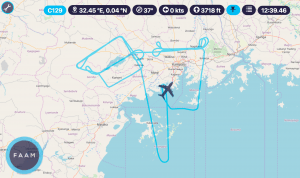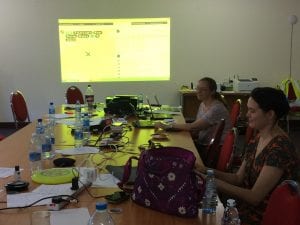Saturday 26 January
This morning, the aircraft did a repeat of yesterday’s flight plan over Lake Wamala and downwind of Kampala. This gives us another chance to examine the methane emissions from the lake and surrounding swamps (which I think are papyrus swamps like the ones we saw at the nearby airfield the other day), which also might have been polluted by some small fires dotted about the place, and to look at a more complex mix of pollutants coming from the capital city. The FAAM aircraft has done flights like this downwind of cities like London and Lagos, so it will be interesting to see what we find here. Everyone I spoke to seemed very happy with how the flight went, as collecting good data is what we are all here for!
I wasn’t on board, as I’m going back to the UK tonight after nearly a week here. It’s a shame I only got to do one flight, but this is not that surprising given how uncertain it is doing field work in a country that we have never worked in before. You need to build in a lot of contingency for these things, and me having only one flight is not even close to being a factor in our plans. I came along to help with the heavy workload of planning and flying during an intense campaign, so hopefully the others who are staying for another week or more will have been able to pace themselves a bit more than they would otherwise. You can’t really have scientists working long days every day for weeks on end – it’s not healthy even if it’s just for a short time in the field. It also helps to have extra people on hand in case of illness. We have been putting 3 mission scientists on the crew list but flying just 2 of them. This means that if one of us feels even a little ill, they can stay on the ground without any problem with having the right passes sorted out for the airport in advance. This is working really well, as it’s fairly common to get a tummy ache on campaign in tropical regions, and nobody wants to be on an aircraft when that happens!
I’ll miss the excitement of the field campaign when I go back to the UK, as you don’t get the same insight into every aspect of the work from afar – like discussing options for upcoming flights based on how the weather forecast is developing over breakfast, finding out the latest instrument issues or breakthroughs at lunch, or mapping out that future Nature paper over a Nile Special lager and curry in the evening. There is so much value to be gained from going on a campaign that I am extremely grateful I was able to take part. I will continue to send in forecast maps that I have set up with the Met Office for the campaign to help with the flight planning, and keep tabs on what’s going on, but I will really miss the random chats I won’t have with all the great people working on this project. The campaign hasn’t even finished, and I can’t wait until the next project meeting comes along!

